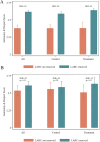Removal of long-acting reversible contraceptive methods and quality of care in Dar es Salaam, Tanzania: Client and provider perspectives from a secondary analysis of cross-sectional survey data from a randomized controlled trial
- PMID: 38261598
- PMCID: PMC10805313
- DOI: 10.1371/journal.pgph.0002810
Removal of long-acting reversible contraceptive methods and quality of care in Dar es Salaam, Tanzania: Client and provider perspectives from a secondary analysis of cross-sectional survey data from a randomized controlled trial
Erratum in
-
Correction: Removal of long-acting reversible contraceptive methods and quality of care in Dar es Salaam, Tanzania: Client and provider perspectives from a secondary analysis of cross-sectional survey data from a randomized controlled trial.PLOS Glob Public Health. 2024 Jul 5;4(7):e0003494. doi: 10.1371/journal.pgph.0003494. eCollection 2024. PLOS Glob Public Health. 2024. PMID: 38968245 Free PMC article.
Abstract
Access to removal of long-acting reversible contraception (LARCs) (e.g., implants and intrauterine devices (IUDs)) is an essential part of contraceptive care. We conducted a secondary analysis of cross-sectional survey data from a randomized controlled trial. We analyzed 5,930 client surveys and 259 provider surveys from 73 public sector facilities in Tanzania to examine the receipt of desired LARC removal services among clients and the association between receipt of desired LARC removal and person-centered care. We used provider survey data to contextualize these findings, describing provider attitudes and training related to LARC removals. All facilities took part in a larger randomized controlled trial to assess the Beyond Bias intervention, a provider-focused intervention to reduce provider bias on the basis of age, marital status, and parity. Thirteen percent of clients did not receive a desired LARC removal during their visit. Clients who were young, had lower perceived socioeconomic status, and visited facilities that did not take part in the Beyond Bias intervention were less likely to receive a desired removal. Clients who received a desired LARC removal reported higher levels of person-centered care (β = .07, CI: .02 - .11, p = < .01). Half of providers reported not being comfortable removing a LARC before its expiration (51%) or if they disagreed with the client's decision (49%). Attention is needed to ensure clients can get their LARCs removed when they want to ensure patient-centered care and protect client autonomy and rights. Interventions like the Beyond Bias intervention, may work to address provider-imposed barriers to LARC removals.
Copyright: © 2024 Wollum et al. This is an open access article distributed under the terms of the Creative Commons Attribution License, which permits unrestricted use, distribution, and reproduction in any medium, provided the original author and source are credited.
Conflict of interest statement
The authors have declared that no competing interests exist.
Figures

References
-
- Brunie A, Aw FNRS, Ndiaye S, Dioh E, Lebetkin E, Lydon MM, et al.. Making removals part of informed choice: a mixed-Method study of client experiences With removal of long-acting reversible contraceptives in Senegal. Global Health: Science and Practice. 2022. [cited 25 Sep 2022]. doi: 10.9745/GHSP-D-22-00123 - DOI - PMC - PubMed
-
- World Health Organization. Family Planning—A global handbook for providers. World Health Organization; 2018. Available: http://www.who.int/reproductivehealth/publications/fp-global-handbook/en/
-
- Senderowicz L, Pearson E, Hackett K, Huber-Krum S, Francis JM, Ulenga N, et al.. ‘I haven’t heard much about other methods’: quality of care and person-centredness in a programme to promote the postpartum intrauterine device in Tanzania. BMJ Global Health. 2021;6: e005775. doi: 10.1136/bmjgh-2021-005775 - DOI - PMC - PubMed
